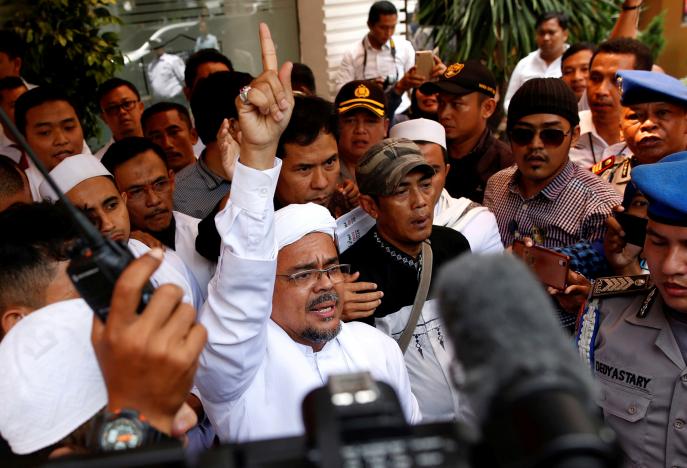The relationship between the Indonesian Ulema Council (MUI), the nation’s highest scholarly authority on Islam, and hardline Islamic groups like the Islamic Defenders Front (FPI) is enigmatic to say the least. Sometimes, MUI publicly distances itself from hardliners, yet, other times, they appear to be close allies.
This is an evidence supporting the latter theory. One of the biggest talking points in Indonesian media at the moment is how FPI leader Rizieq Shihab has managed to continually evade police summons for questioning regarding his pornography case. The Jakarta Metro Police last week promised to forcibly detain Rizieq, but the problem is that the firebrand “cleric” had spent the last couple of weeks abroad, first in Saudi Arabia and then Malaysia.
The National Police on Friday announced that they could potentially ask Interpol to issue a “red notice” for Rizieq, which puts out a notice that would allow partnering law enforcement agencies in other countries to arrest and extradite him to Indonesia.
But the MUI believes the police seeking help from Interpol to catch Rizieq is over the top.
“The red notice is unnecessary. [The police are treating Rizieq] like a criminal,” said MUI deputy chairman Ikhsan Abdullah, as quoted by Tribun.
“Why can’t the investigators just go to where Rizieq currently is?”
Where Rizieq currently is is quite a mystery. According to the latest information from his lawyer, Rizieq has returned to Saudi Arabia after leaving Malaysia recently (how is he able to exit and enter Saudi so willy nilly when regular Indonesians have to wait a few weeks, if not months, to be granted umrah pilgrimage visas?).
Run as he might, Rizieq may soon be officially branded a criminal (technically, he already is as he’s been jailed twice for inciting violence in the past). In addition to the pornography investigation, Rizieq is currently a suspect in one defamation case and under investigation in several other cases, including one for blasphemy.
The MUI is officially not a political organization but they have shown clear double standards in their stance towards Rizieq and on former Jakarta governor Basuki “Ahok” Tjahaja Purnama. The MUI essentially sparked the mass Islamic protests against Ahok after they issued a fatwa declaring that the then-governor, a minority Christian of Chinese descent, had committed blasphemy against Islam by saying that his political opponents often use a verse in the Quran to dissuade the public from electing non-Muslims into leadership positions. After numerous mass protests around Indonesia, a few of which attracted hundreds of thousands of demonstrators, Ahok was last week sentenced to two years in prison for blasphemy despite the prosecution admitting there was insufficient evidence for the charge.




